21 Best Search Engines For 2024: Alternatives To Google Search

Looking for an alternative to Google Search? We’ve got you covered.
Google might be the most popular search engine on the market, but it isn’t the only one. There are a ton of alternatives to Google Search out there that you can use instead.
Below, we’ve listed some of our favorites. Many of these alternatives to Google are ad-free, offer more attractive privacy policies, and still serve up the same high-quality results.
So without further ado, here are the best search engines on the market!
The best search engines other than Google – summary
- DuckDuckGo – Best alternative to Google for privacy
- Bing – Best for earning points whilst you search
- Escosia – Best for environmentally conscious users
- Neeva – Best ad-free alternative to Google
- Yahoo! – A popular web portal with a search engine powered by Bing
- YouTube – Best for video search
- CC Search– Best for finding copyright-free content
- Baidu – Best for Chinese users
- Swisscows – Best family-friendly search engine
- Gibiru – Uncensored private search engine with zero retargeting
- Startpage – Serves up answers from Google while protecting your privacy
- Yandex – The number one search engine in Russia
- Naver – A South Korean search engine with comprehensive search features
- AOL – One of the first popular search engines with an easy to use interface
- Search Encrypt – A powerful, privacy-forward search engine that uses local encryption
- Ask – Another popular web portal and search engine
- OneSearch – Best for unfiltered private browsing
- Wiki.com – Best for searching for Wikipedia articles
- Gigablast – Best private browser with advanced search functions
- Boardreader – Best for searching forums and message boards
- Blackle.com – Best black screen search engine
#1 – DuckDuckGO
DuckDuckGo is the perfect choice if privacy is your top browsing concern.
Like Google, DuckDuckGo offers their own mobile & desktop browsers. By default, this browser doesn’t collect or store any personal information at all.
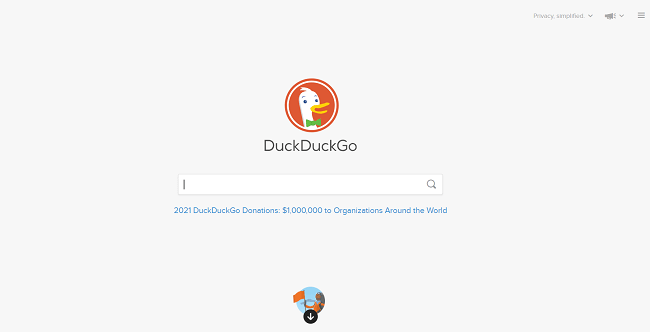
With DuckDuckGo, you don’t have to worry about unscrupulous companies using your browsing habits and personal information to target you with advertising content. You can also rest easy knowing that none of your financial deals are stored when completing online transactions.
Note: Since first writing this post, DuckDuckGo has been through somewhat of a controversy involving a deal with Microsoft that allowed the user of trackers. While the platform is still privacy-focused, it’s not quite as private as we were all led to believe. So, I’d urge caution if privacy is your top priority. If you’d like to learn more about the state of this search engine, you may also want to check out Startup Bonsai’s roundup of DuckDuckGo statistics.
#2 – Bing
Bing is the second most popular search engine after Google and comes installed as default on most Windows and Microsoft devices. Like Google, Bing has a powerful algorithm that can ensure you find what you’re looking for quickly and easily.
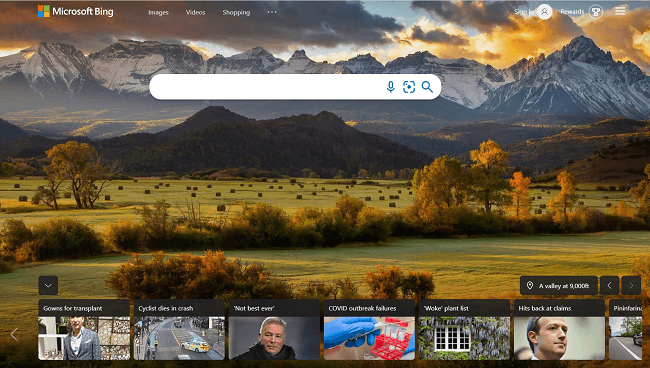
What makes Bing unique is that it allows you to accumulate points while browsing that you can spend in Microsoft and Windows stores.
#3 – Ecosia
Did you know that Google searches have a carbon footprint? All the server resources used to power your searches contribute to CO2 emissions. Ecosia wanted to tackle that problem, so they released their own environmentally-friendly search engine.
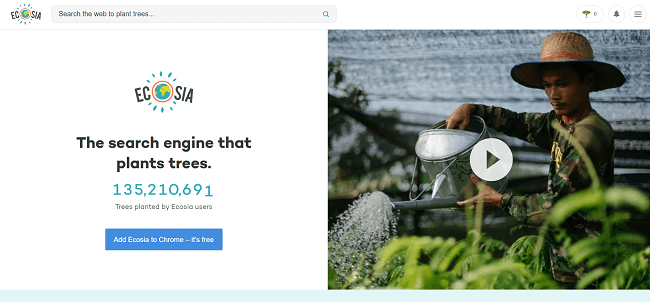
Not only do they use servers that run on 100% renewable energy, but they also use the revenue generated by user searches to plant trees and support nonprofit organizations. Ecosia will plant a new tree for every 45 searches (on average).
They also don’t sell your data to advertisers or use third-party trackers. If you care about the environment and want your internet searches to go towards a good cause, Ecosia is the search engine for you.
#4 – Neeva
If you hate seeing Google ads at the top of the search results pages, try Neeva. Neeva is an ad-free search engine developed by top Google execs who wanted a second chance to make something “uncorrupted by everything that went wrong the first time”.
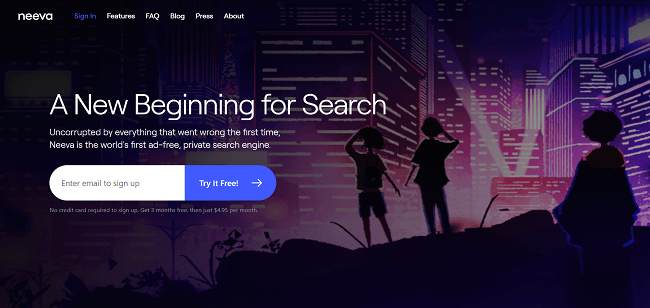
The algorithm and privacy features are top-notch, and you’ll never see any ads. The only problem is that it isn’t free. Neeva can’t rely on advertiser revenues to fund its business model, so they charge users $4.95 per month instead.
If you don’t want to fork out for that just yet, you can also sign up for a free trial and see how it compares to other search engines.
#5 – Yahoo!
Back in the early days of the internet, Yahoo! was one of the most popular search engines around. They had 36.7% of the market share in 2001. Unfortunately, that’s since dropped to just 1.64% as Google secured its market dominance.
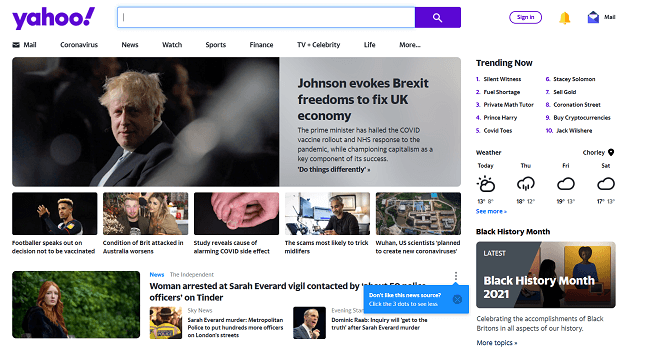
However, Yahoo! continues to be a solid alternative to Google. These days, it’s powered by Bing, which means you’ll see the same results as Bing, but the interface is a little more exciting.
The Yahoo! homepage is a complete web portal that lets you do much more than just search. You can catch up with the latest news or check your mail from the same place, which makes it a great homepage for your browser.
#6 – YouTube
A lot of people think of YouTube as a social media site, but it’s actually the second largest search engine in the world.
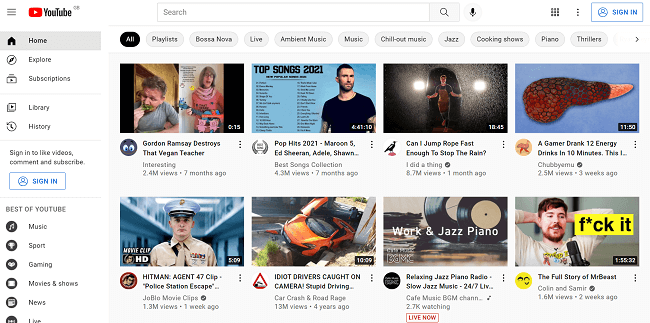
Unlike Google, YouTube is a video-only search engine. It won’t help you to find blog posts and informational articles, but if you’re looking for video content, there’s no better option. And these days, there’s a video for pretty much anything you could need to know.
However, it’s worth pointing out that YouTube is owned by Google Inc so if your gripe is with the company as a whole, it might not be the right choice for you.
#7 – CC Search
CC Search is a search engine designed to make it easy to find copyright-free content to use in your projects. It draws results from platforms like Flickr and Soundcloud and only displays results that are labeled under a Creative Commons license.
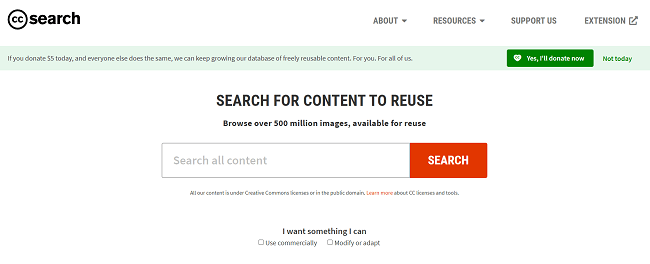
If you’re looking for an image to use in your designs, or a music track to use in your YouTube videos, try CC Search.
#8 – Baidu
Baidu is China’s number one search engine and the fourth most popular search engine worldwide. The Chinese government blocks Google within the country, so citizens have to rely on Chinese engines like Baidu instead.

The interface is written in Chinese and it pretty much only brings up Chinese search results, so if you don’t speak the language, it’s probably not the right choice for you. However, if you’re looking for Chinese content, it might be worth checking out.
#9 – Swisscows
Swisscows’ USP is its family-friendly filters and privacy features. It markets itself as a family-friendly search engine and does a great job of filtering out violence and pornography. It also offers total privacy and never collects, stores, or tracks user data.
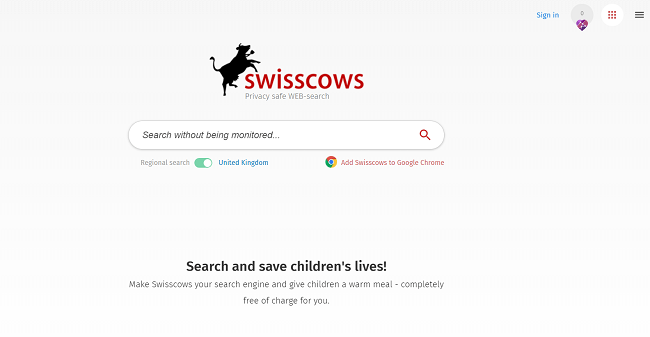
The Swisscows AI-powered search algorithm is much like Google’s in that it works to understand the context of your query in order to provide the best, most accurate results.
#10 – Gibiru
Gibiru is a powerful search engine that caters to people concerned about censorship and online privacy. They claim to operate ‘outside of Big Tech’s censorship bubble’ and give searchers access to the information they’re looking for with complete privacy.
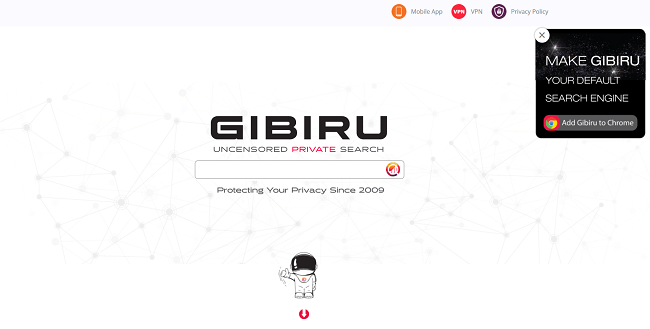
They don’t sell data to advertisers or support retargeting ads and instead operate on a commission-only revenue model.
#11 – Startpage
Startpage is powered by Google, which means you’ll get the same top-notch search results.
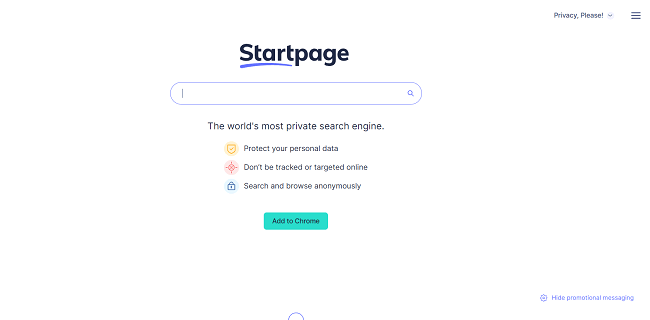
However, unlike Google, it won’t track or store your search history. It also offers a URL generator and proxy service.
#12 – Yandex
Yandex is Russia’s answer to Google.
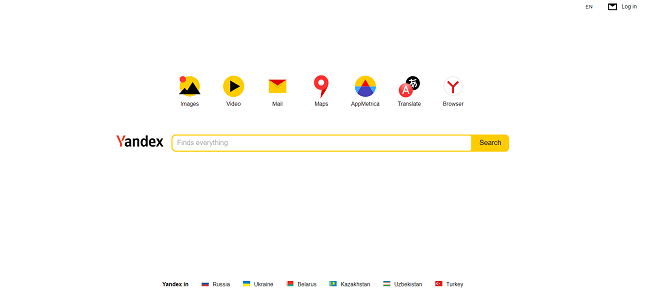
It’s used by over 45% of internet users in the country and is also popular in countries like Belarus, Turkey, and Ukraine. It’s easy to use, fast, and accurate.
#13 – Naver
Naver has been called ‘the Google of South Korea’.
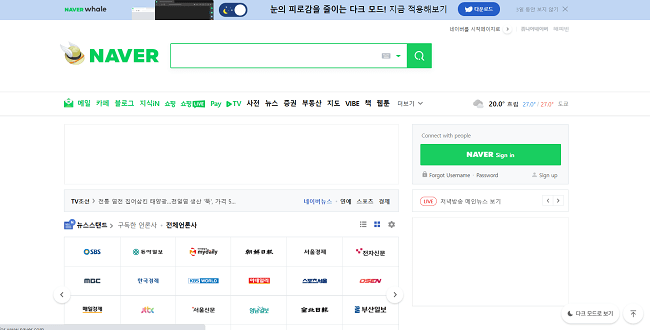
It’s an online search platform that offers comprehensive search features, such as the ability to compile results across different categories and list them on the same page.
#14 – AOL
AOL is another one of the early pioneers of internet search.

Like Yahoo, it’s not just a search engine but a complete web portal that offers news, weather, email, and more from one page. Their search feature is called AOL Search and is powered by Bing.
#15- Search Encrypt
Search Encrypt is a privacy forward browser that uses local encryption to prevent user information from being stored and tracked.

Search Encrypt is a powerful search engine that gathers results from a variety of partnered networks to provide the best results. If you’re looking for a private browser with powerful search capabilities, this could be it.
#16 – Ask
Ask is another search engine that’s been around since before the age of Google. Previously known as Ask Jeeves, it was the go-to place to find answers to long-string questions.
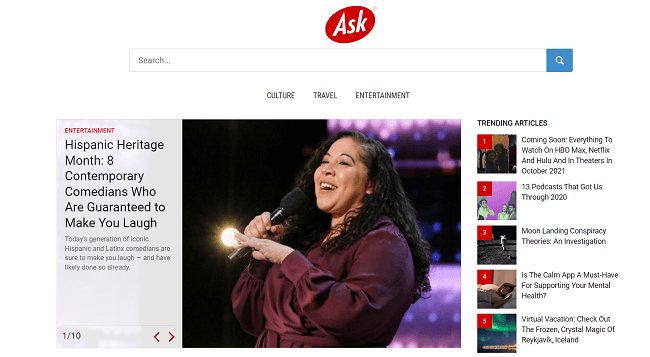
However, modern-day Ask.com works in a similar way to Google. It provides you with results for your search queries as well as some related search queries to help you find out more about your chosen topics.
The Ask.com homepage also provides news updates, which is always a nice addition if you’re thinking of setting it as your default browser.
#17 – OneSearch
OneSearch is another great search engine option for individuals and businesses that are keen to keep their searches secure. Every search on OneSearch is private and encrypted meaning that your information is safe from cybercriminals and marketers alike.
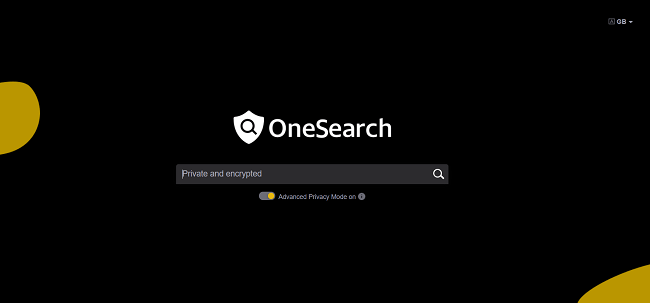
Another bonus of using Onesearch is that cookies and browsing history information have no effect on your search results. All your results are unfiltered meaning you will have access to all the information that’s out there.
#18- Wiki.com
Wiki.com is a browser designed to help you search the world’s largest internet encyclopedia quickly and efficiently. With over 6,384,950 articles, it’s not always easy to find what you’re looking for on Wikipedia.
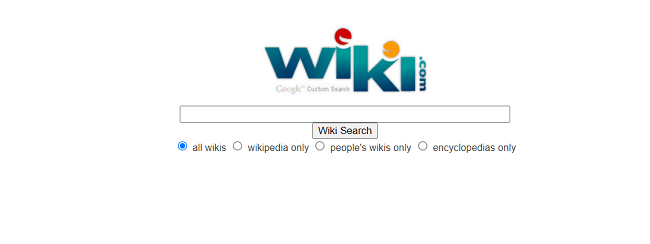
However, with Wiki.com, you can search Wikipedia pages and find the exact results you’re looking for in just a few clicks. There are also options to filter your searches to include all wikis, people wikis, encyclopedia results, and more.
#19 – Gigablast
Gigablast is a privacy forward browsing option that doesn’t store any of your personal information to be used for marketing purposes. While the visual aspects of Gigablast are quite old-fashioned, it’s still a powerful and effective alternative to Google.

It has a number of advanced search options available that will help you to filter your queries and find the best information possible. You can also search news, images, and more using the Gigablast browser.
#20 – Boardreader
Sometimes, it’s better to get actual user opinions than sifting through ads and business pages on Google, and that’s where Boardreader comes in. BoardReader is a search engine designed for Reddit lovers and anyone else that prefers forum answers to generic search.

When you input a search into Boardreader, the algorithm will scour web-based bulletins and discussion forums to find answers from real users. When you perform a search, you’ll be presented with the most relevant forum posts, plus information about which forum the comments were made on and when.
#21 – Blackle
Blackle is an energy-saving search engine that is powered by Google. That means you’ll get the same search result accuracy as Google, but you might save energy thanks to the black background of the browser homepage.
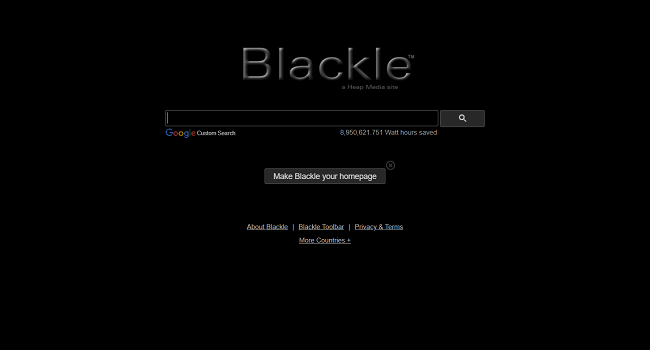
When searching with Blackle, you can see exactly how many watt-hours of energy are being saved by other users worldwide. If you’re keen to make small changes to become more environmentally friendly, Blackle may be the browser for you.
Choosing the best Google alternative for your browsing needs
There you have it – 21 search engines other than Google that you can use.
Not sure which one to try first? Here’s what we’d recommend:
- Use DuckDuckGo if you’re concerned about privacy. It won’t collect or store any of your personal data
- Try Bing if you want to earn points for your searches. You’ll earn Microsoft Rewards points that you can redeem for prizes.
- Check out Ecosia if you care about the environment. It’s an eco-friendly alternative to Google that uses the revenue generated from your searches to plant trees.
Happy searching!
